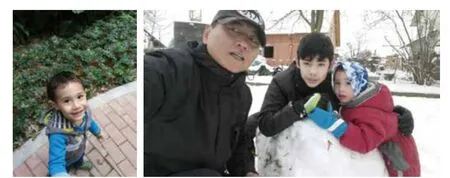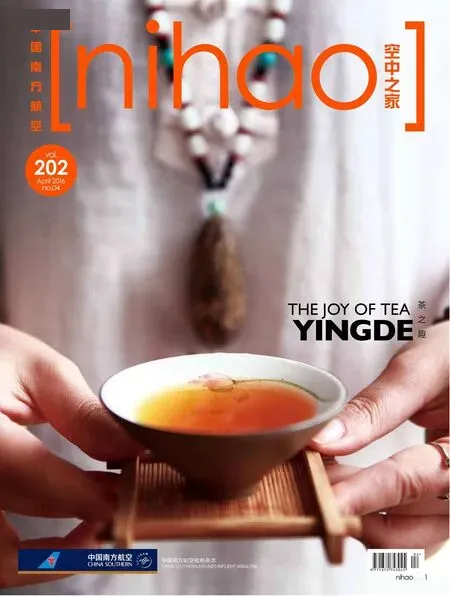“外来媳妇”戴安娜:一个书虫
“外来媳妇”戴安娜:一个书虫
lf you mention to a local Cantonese family about the TV drama “Guangdong Daughters-in-Law”, they will immediately think of the tall blond western woman called Diana. Yet what people know very little of is what the actress who plays her, Esther Haubensack is really like in person.

Crew of Guangdong Daughters-in-Law《外来媳妇本地郎》剧组。
Six years ago, when I fi rst started to work for a local TV channel as an editor, I was assigned to co-work with “Diana”, a cheerful American housewife on the screen, as people liked to call her.
My debut with her was a short programme introducing Cantonese food, and she was the host to try out the dishes. There was a heatwave that summer, and the working environment was bad enough. Esther however, sat quietly amid the hustle and bustle in the studio with what seemed to be an invisible air of peacefulness around her. She didn't interact with others when she was free, instead, she buried herself in her books.
I hate interrupting a person reading a book, but it was my job. When she listened to my instruction, she still looked pensive to me. I even began to worry if she was capable to deliver the“cheerfulness” needed for the show.
My doubt vanished as Esther's face brightened up the second the camera started rolling. Her eyes spar-kled and her voice was loud and clear. However boring the lines were, she read them with moving affec-tion. She became a totally different person to me. I was impressed.
When her piece to the camera had fi nished, the“inner fi re” was suddenly switched off. She returned to her own quiet world, and started to read a book about archaeology.
Over the next two years, I witnessed her going through books of a surprising diversity, from history to linguistics, culture to religion. In a typical Chinese working environment, it is considered essential to maintain a good relationship with one's colleagues. However, off i ce friendship did not seem to bother Esther too much.
“I don't really have many stories to entertain you guys,” she once said.
Seems to me, Esther is someone who values more of the spiritual world. Simply for this, she deserves my full respect.

lNTRODUCTlON
Esther Haubensack, German actress. She majored in sinology in Ludwig Maximilian University, Freistaat Bavaria, Germany. She started her further studies in Peking in 1992 and soon learned the northern traditional art - “crosstalk” from maestro Ding Guangquan.
Later, she decided to live in Canton, as she found learning Cantonese benef i cial for an even deeper un-derstanding of ancient Chinese. First Zhongshan, then Guangzhou, Esther fi nally ended up with the fa-mous TV drama.
Esther's background as a linguistics learner helps her to fully comprehend Chinese history, literature and culture. As the German saying goes, “Übung macht Meister” – practice makes perfect.
埃斯特·豪本萨克,这位在80年代就读于德国南部联邦州巴伐利亚的汉学学生,在1992年踏上了中国的大地。她在北京继续深造汉语,同时跟随着名相声大师丁广泉学习京腔相声。也许她注定跟南方结缘,不久后她来到中国南方——广东,继续自己的演艺事业,随后更加在电视上让广东的观众们领略了“西关大屋飞入外来雁”说的一口洋人粤语。
埃斯特学习粤语的动机,在当年却无比单纯:她觉得粤语更加接近古汉语,古诗中的平仄更加能够在粤语中领悟出来。为了能更好地读欧阳修的著作,她决定投身粤语文化的世界中看个究竟。
从发音,到词汇、语法和各种谚语,埃斯特就像一个机械修理师那样解剖东亚的各种语言和方言。对于她来说,了解语言的内部结构和运作机理,是理解东亚各种文化的很好途径。她对语言的执着程度,几乎让她成为了语言学的“机械师”。她就好像拿着高倍数放大镜的钟表师傅那样,检视着一门语言最细微部件的运作情况。在我看来,她的这种执着和严谨精神,是德意志伟大工匠精神的一种传承。无论机械、哲学、光学、化工,还是音乐艺术,这个民族一直用这种精神,缔造了各种近乎神话的成就。
正如德语谚语所言:Übung macht Meister,“不断锻炼成就大师”,她的这种精神值得我们敬佩。
如果你跟一个广东本地家庭说起《外来媳妇本地郎》,他们一定会对剧中“老四”的媳妇戴安娜印象深刻。这700多集的热剧让“戴安娜”成为了广东街头巷尾人尽皆知的人物。然而,这位充满欢声笑语的金发女郎实际上又是怎样的一个“外来媳妇”呢?这篇文章将带你走近荧幕背后的戴安娜。
6年前,我在广州一个本地电视频道当一个小小的编导,我的合作对象,就是那个在荧幕上人尽皆知的戴安娜。现实生活中,她来自德国南部巴伐利亚州,名叫埃斯特·豪本萨克(Esther Haubensack)。
在我的处女作中,戴安娜担任尝试一味广州本地菜的出镜主持。那是个炎热的夏天,录制环境非常恶劣。作为初出茅庐的毕业生,大家吵吵闹闹但也是各忙各的,唯有那个身材高大的“戴安娜”安静地坐在角落,埋首书中。在她的身上,仿佛有一张与周遭环境隔绝的透明薄膜——任凭摄像和餐馆的人多么吵闹,她依然头也不抬。
我反感打断一个正在读书的人,然而出于职业的需要却不得不这样做。我开始讲解自己撰写的台词,她则一脸茫然地看着我写的东西。我开始有些担心她在录制的时候是否会有任何火花可言。
然而,当摄像机开启,她的双眼竟瞬间绽放出光彩,仿佛切换了一个人格!像歌剧名伶一般,她脸部变得异常有表现力,响亮的女中音在整个拍摄场地上空盘旋,抑扬顿挫,穿透了摄像机的麦克风。在我看来乏味的台词,她却说得津津有味;无论食物为了拍摄出最好的效果,不断重复翻炒而变得干硬难吃,她还是在镜头面前用最陶醉的表情,把东西放在嘴里反复咀嚼……好吧,这就是电视的世界。
很快,“戴安娜”的戏份就结束了。她身上的那团火也随之熄灭。她又回到她的书本世界里。我偷偷一瞥,看到书的封面用德语写着“考古学”。在随后的两年多时间里,我们都以这种方式合作着,我早已习惯她的沉默,当然也看到她读的书不断在变化,从历史到语言学,从考古到人类学,甚至宗教书籍。在中国人的团队文化里,人们喜欢热热闹闹,打成一片,而不少外籍主持人也很快适应了这种打趣说段子的氛围。然而,对于“戴安娜”来说,除了拍摄,她的生活似乎也有另外一层追求。“我其实没什么八卦花边新闻可以跟你说呢。我这十几年住在广州,出来逛街应酬的时间加起来可能不超过一年。”她这样跟我说过。
也许有些人能够对当下生活感到满足,但是“戴安娜”却仿佛在自己的精神世界中探寻更加重要的东西,而这些东西需要耗费巨大的脑力,仿佛周遭的嘈杂环境和各种琐事她都无暇搭理。这也许被某些人视作一种自傲和清高,然而我觉得完全不是这样。
N: NIHAO
E: Esther
Haubensack
N: What made you choose to study Chinese when you were a student in Bavaria?
E: I did try some other foreign languages, such as Arabic, but I found the intonation too diff i cult for me. Then I tried Russian. The Cyrillic letters are fi ne by me, but the declensions of the verbs are just too complicated.
N: German also has declensions. Doesn't it help you to learn Russian?
E: Yes. That bothered me enough. Then later I tried Hindi but the university I studied in didn't have a faculty for Hindi and I had to study Sanskrit as part of the curriculum. Japanese was very popular at the end of 1980s and the beginning of the 1990s, as the economy of Japan was on the rise. Chinese, in comparison, was not a popular language to learn at the time. Therefore, it was easier to get a scholarship for this course. I had more opportunities to participate in many events. I also helped tidying up the library and assisted the tutors.
N: Then later you went to Beijing for further studies. Can you share with us your secrets of learning Chinese so well?
E: Beijing at the time had a really good environment for leaning Mandarin. My roommates were Japa-nese and they didn't speak any English, so we were forced to speak Chinese for practical communica-tion. The most interesting thing was, when I was a student, the university still had a separated canteen for foreign students and Chinese students. I never went to the foreign students' canteen. Instead, I chose to go to Chinese students' canteen. All the boys got 2 “liang”(1“liang” equals to 50 grams) of rice while the girls got 1 “liang”. I used Chinese to tell the canteen staff to give me 2 “liang” and all the male students would look at me being amused. Of course 2 “liang” was too much for me. But generally, many other foreigners would learn and speak Chinese in a natural and much better way than me.
N: While you were in Beijing, you learnt crosstalk with maestro Ding Guanggen. Why didn't you choose it as a career?
E: First of all, I couldn't write script on my own and I didn't think my humour would make people laugh. Nowadays it's a little bit hard to really create clean jokes to make people laugh. You will really have to make a lot of extra body-language or exaggerated gestures to impress the audience for TV. Any-way,“below waistline” humour is just not my style.
N: Why did you only stay in Korea for a year?
E: Because by then, I was already married and my husband was based in Beijing. He couldn't speak any Korean, so it was a better choice for me to go back to China. It is funny that when my husband visited me in Seoul, he could not have any conversation with the Koreans at all.
On one evening, we were going to have a dinner at a restaurant. The restaurant waiter asked my husband in Korean and he could not hear a word. I must answer the waiter's question in Korean and the whole restaurant was surprised to fi nd a white woman could speak Korean instead of an Asian man.
N: After coming back to China, why did you start to learn Cantonese?
E: The decision was to gain a better understanding of ancient Chinese. When you try to read and understand ancient Chinese poems, Mandarin's intonation would not help you read the poems aloud in a more original way. Therefore I encouraged myself to learn Cantonese. I was lucky to fi nd a very good textbook with all the details of the language including basic pronunciation, grammar, vocabulary, situa-tion conversation and so on. As long as I have a good textbook, I can learn a language very quickly.
N: So you learnt Cantonese all on your own?
E: Well later I came to Guangzhou to meet the author of the textbook, a professor at Jinan University. He gave me one-to-one intensive courses for a week.
N: You are from Freistaat Bavaria and it has its own dialect in Germany like Cantonese. Do you share your pride of your own dialect just as we are proud of Cantonese?

Esther's familyEsther的家人。
E: Germany has many dialects and of course it has a standard language “Hochdeutsch”(High German). In the case of Bavaria, not all the cities speak Bavarian dialect, just like the case of Guangdong, where you have Cantonese cities as well as Hakka and Chaoshan cities.
Nuremberg for example, is a Bavarian city but it doesn't speak Bavarian dialect. Culturally it is more like a Baden-Württemberg city. We take the area along the Danube River as “real” Bavarian cities and the dialect in Austria is also quite like our dialect. And even among these Bavarian-speaking cities, there are some tiny differences in the accents. I would say Bavarian dialect and culture are more similar to Northern Chinese culture. Bavaria is a rural province and its culture is a rural one. There are some TV or radio channels which broadcast the dialect, but it is a pity that schools don't teach it anymore.
N: Do your children travel as well?
E: Sure. But I will not allow them to travel alone as my parents did with me. They would need parental accompaniment. If I have to bring them around, I would try to let them communicate with the locals instead of following the tourist clichés.
N: How do you spend the time on a plane? Do you read as you usually do?
E: I actually watch fi lms if I can. But of course I read if there is nothing interesting to watch. When I start reading, I cannot stop. I once read Bible stories on the plane, and I got so touched that I even cried. The fl ight attendant was surprised to fi nd me sobbing before I told her it was merely because of a book. I was very embarrassed.
N:当你还在巴伐利亚州读书的时候,为什么选择汉语呢?
E:我也尝试了一些其他的语言。比如说阿拉伯语,但是我当时发现音调发音在文本上没有标注,所以显得有些麻烦;然后我也尝试了解过俄语,俄语西里尔字母对于我来说并不困难,可是它的动词变格太多了,非常复杂。中文对于我来说够简单的了。
N:可是德语本身动词也很多变格的呢!欧洲语言不都是有变格的吗?
E:是啊,但是母语本身的变格已经够麻烦了。其实我当初也想学印度语,可是当时我的大学并没有这一门学科。而且当时要学印度语,首先就要学梵文。在我求学的年代,欧洲想学东方语言的学生几乎都喜欢学日语,所以日语系几乎挤破了头。于是我选了相对较冷清的汉语系,因为这样申请奖学金更加容易,而且系里人比较少,我可以参与更多的活动,比如帮忙整理一下图书馆里的一些资料,这样对我来说帮助更大。
N:然后你就来到北京继续学习了。你对语言方面的投入真大啊,而且收效非常好。
E:当时的北京,学习汉语的氛围其实很好。我的舍友都是日本人,她们不懂英文,所以交流起来必须用汉语。我学习汉语的途径就是,每学一课,比如到商店买东西的场景,我都跑到校外的小卖部,在店员身上“试验”各种词汇。当时的校园还是区分了外国留学生饭堂和中国学生饭堂,而我更加喜欢往中国学生的饭堂里面跑,更加好地观察和学习他们的交流习惯。有趣的是,当时饭堂的员工都给男生二两饭,而只给女生一两饭。我每次都要求给我二两饭,前面排队的男生都看着我笑起来……
N:在北京的时候,你开始跟随丁广泉学习相声。为什么再没从事这门艺术呢?
E:首先,我不会自己写剧本,写出来也怕人家觉得不好笑。我觉得现在,在电视上说相声,要逗人家笑可不是那么容易,有时候智商被拉下来了,品位也拉下来。太多夸张的扮相和过分喧哗的造型,甚至有些比较俗的内容都不适合我。
N:回中国后,你就开始学习粤语了?
E:我学习粤语的目的是更好地理解汉语古文。当你尝试阅读一些古诗的时候,你会发现普通话的音调太简单,而粤语能够更好地让你理解其中的平平仄仄。我很幸运地找到了一本非常好的对外粤语教材,它罗列了基本的发音、语法、词汇、情景对话这些东西。只要有一本教材在手,我学一门语言并不困难。
N:你会觉得带孩子到其他国家旅行也是一种很好的教育手法吗?让他们见识一下这个世界。
E:是的。但是我认为他们不应该独自出游,我的父母曾经也让我独自出游,但是这是不对的。如果我陪伴他们到其他国家旅游的话,我会让他们见识旅游热点以外的一些真正的风土人情,跟当地人展开真正的交流,而不是被导游拖着走。
N:你如何打发在飞机上的时间呢?从中国回德国,耗时很久呢。你是不是像以前那样读书呢?
E:其实我在飞机上更想看看电影。不过没有选择的时候,我还是宁愿读书。有一次我读了一本跟《圣经》有关的故事书。我被书中的情节感动得马上哭了起来。机上的空姐被我吓坏了,虽然她最后知道我是读了书才这样子,我还是感到有些尴尬。
ESTHER HAUBENSACK: AN ACTRESS AS WELL AS LlNGUlST
Text by Josef Ho Photos by Zeng Jian

